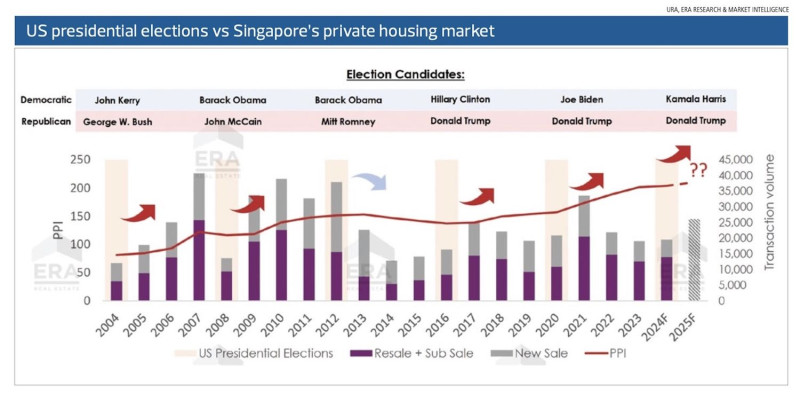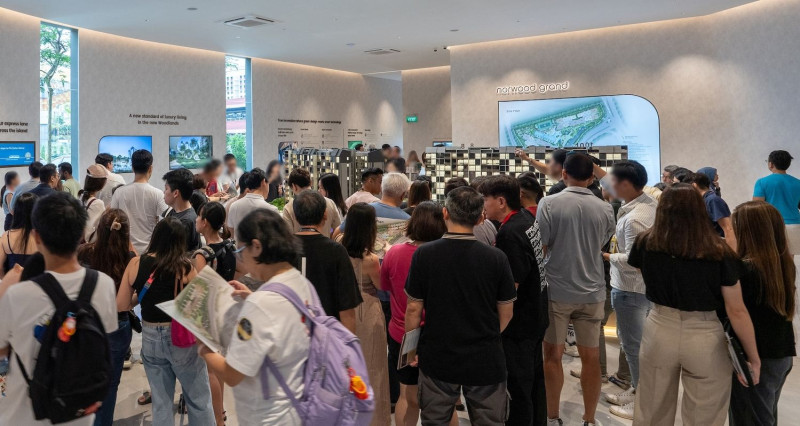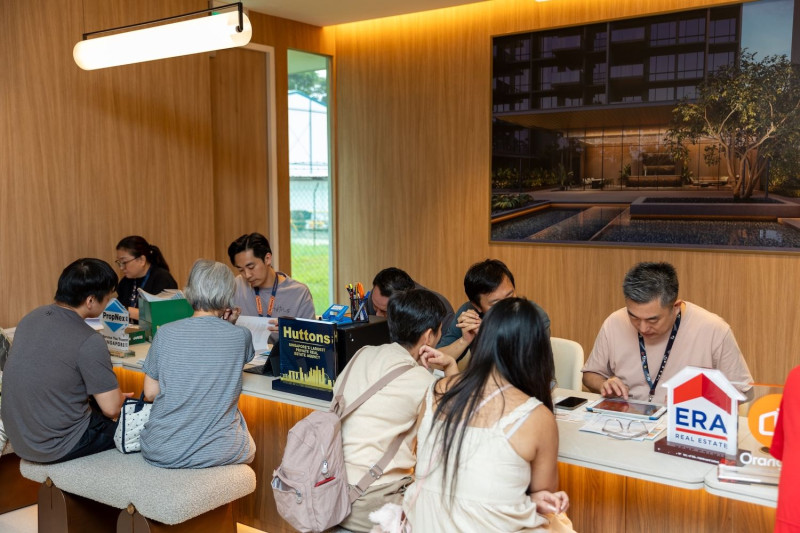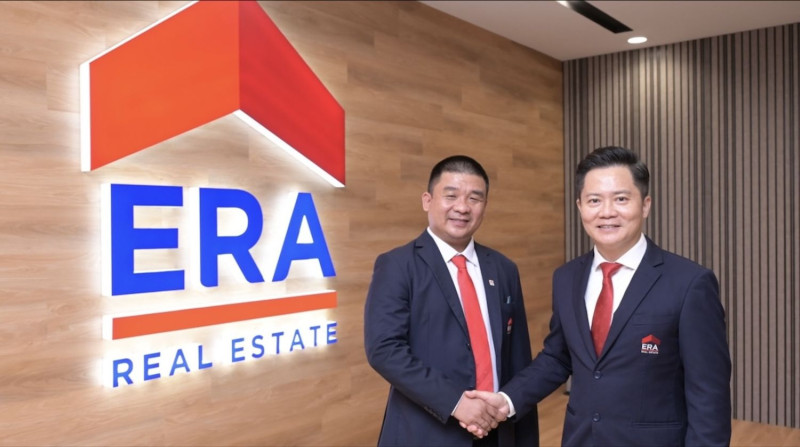Marcus Chu expects 2025 to be ‘a boom year’ for Singapore’s private housing market
Marcus Chu, CEO of ERA Singapore, observed an interesting correlation between the Singapore private housing market and US presidential elections. Looking back 20 years, starting with George W. Bush’s 2004 re-election, there has been an upswing in Singapore’s private property price index and transaction volume following each US presidential election, except in 2012.
Chu attributes this exception to a series of property cooling measures introduced by the Singapore government in 2013, including hikes in additional buyer’s stamp duty (ABSD) in January and the introduction of the total debt servicing ratio (TDSR) loan framework in June.
In Singapore, uncertainty in the lead-up to the US elections on Nov 5 prompted some homebuyers to delay their purchases until greater clarity emerged post-election, says Chu. “In the absence of any major regulatory shifts in recent years, external economic factors like these have often led to increased activity in the housing market.”
Read also: Morgan Stanley Private Equity Asia to become majority shareholder of APAC Realty
Advertisement
Advertisement
In the pre-dawn of the second Trump era, the Singapore housing market is already gaining positive momentum, observes ERA’s Chu. Resale transaction volume has surged since 2Q2024, with new home sales rising steadily since September.
 ‘Sentiment improving’
“With economic sentiment improving, further potential interest rate cuts in 2025, coupled with a slew of new projects slated for launch in the last quarter of 2024, buyer interest is expected to gain even more traction,” Chu says.
It started with the launch of Bukit Sembawang Estates’ 158-unit private condo 8@BT at Bukit Timah Link on Sept 21–22, with 83 units (52.5%) sold at an average price of $2,719 psf.
Oct 5 marked the private launch of the 226-unit, freehold Meyer Blue luxury project on Meyer Road by Singapore-listed property company UOL Group and its subsidiary Singapore Land Group (SingLand). The project saw 114 units (over 50%) sold at an average of $3,260 psf.
On Oct 20, City Developments Ltd (CDL’s) Norwood Grand saw 84% of the 384 units sold during one weekend at an average price of $2,067 psf.
The launch of Kingsford Group’s 916-unit Chuan Park saw 696 units (76%) sold on Nov 10 at an average price of $2,579 psf. It is further evidence of market sentiment shifting to a more positive mode.
Read also: APAC Realty's FY2021 net profit rises 116%, shareholders rewarded with 4 cents final dividend
Advertisement
Advertisement
With three out of six new residential projects slated for launch already out the door, three more will debut in the coming weekend. Chu estimates that about 10,000 new units will be rolled out from 4Q2024 to 1Q2025. Hence, he expects 2025 to be “a boom year” in terms of property transactions.
“While global market uncertainties persist, employment levels in Singapore remain healthy — barring a ‘black swan’ event,” says Chu.
Based on Singapore’s Ministry of Manpower statistics released on Oct 29, the overall unemployment rate for Singapore dipped to 1.8% in September (from 1.9% in August), with the rates for citizens and residents remaining unchanged at 2.7% and 2.6%, respectively. Retrenchments have declined to 2,900 in 3Q2024, from 3,270 the previous quarter.
Median monthly household income stood at $10,869 as of 2023, up from $10,022 in 2022, an inflation-adjusted increase of 2.8% y-o-y.
‘Sentiment improving’
“With economic sentiment improving, further potential interest rate cuts in 2025, coupled with a slew of new projects slated for launch in the last quarter of 2024, buyer interest is expected to gain even more traction,” Chu says.
It started with the launch of Bukit Sembawang Estates’ 158-unit private condo 8@BT at Bukit Timah Link on Sept 21–22, with 83 units (52.5%) sold at an average price of $2,719 psf.
Oct 5 marked the private launch of the 226-unit, freehold Meyer Blue luxury project on Meyer Road by Singapore-listed property company UOL Group and its subsidiary Singapore Land Group (SingLand). The project saw 114 units (over 50%) sold at an average of $3,260 psf.
On Oct 20, City Developments Ltd (CDL’s) Norwood Grand saw 84% of the 384 units sold during one weekend at an average price of $2,067 psf.
The launch of Kingsford Group’s 916-unit Chuan Park saw 696 units (76%) sold on Nov 10 at an average price of $2,579 psf. It is further evidence of market sentiment shifting to a more positive mode.
Read also: APAC Realty's FY2021 net profit rises 116%, shareholders rewarded with 4 cents final dividend
Advertisement
Advertisement
With three out of six new residential projects slated for launch already out the door, three more will debut in the coming weekend. Chu estimates that about 10,000 new units will be rolled out from 4Q2024 to 1Q2025. Hence, he expects 2025 to be “a boom year” in terms of property transactions.
“While global market uncertainties persist, employment levels in Singapore remain healthy — barring a ‘black swan’ event,” says Chu.
Based on Singapore’s Ministry of Manpower statistics released on Oct 29, the overall unemployment rate for Singapore dipped to 1.8% in September (from 1.9% in August), with the rates for citizens and residents remaining unchanged at 2.7% and 2.6%, respectively. Retrenchments have declined to 2,900 in 3Q2024, from 3,270 the previous quarter.
Median monthly household income stood at $10,869 as of 2023, up from $10,022 in 2022, an inflation-adjusted increase of 2.8% y-o-y.

The crowd at Norwood Grand, where 84% of the 348-units in the project have been taken up on the first weekend of launch in October (Photo: City Developments Ltd)

ERA is one of the joint marketing agencies at the 846-unit Emerald of Katong (Photo: Samuel Isaac Chua/EdgeProp Singapore)

Pham Thanh Tuan, chief executive officer of ERA Vietnam, and Marcus Chu, chief executive officer of APAC Realty (Photo: Albert Chua/The Edge Singapore)
 ‘Sentiment improving’
“With economic sentiment improving, further potential interest rate cuts in 2025, coupled with a slew of new projects slated for launch in the last quarter of 2024, buyer interest is expected to gain even more traction,” Chu says.
It started with the launch of Bukit Sembawang Estates’ 158-unit private condo 8@BT at Bukit Timah Link on Sept 21–22, with 83 units (52.5%) sold at an average price of $2,719 psf.
Oct 5 marked the private launch of the 226-unit, freehold Meyer Blue luxury project on Meyer Road by Singapore-listed property company UOL Group and its subsidiary Singapore Land Group (SingLand). The project saw 114 units (over 50%) sold at an average of $3,260 psf.
On Oct 20, City Developments Ltd (CDL’s) Norwood Grand saw 84% of the 384 units sold during one weekend at an average price of $2,067 psf.
The launch of Kingsford Group’s 916-unit Chuan Park saw 696 units (76%) sold on Nov 10 at an average price of $2,579 psf. It is further evidence of market sentiment shifting to a more positive mode.
Read also: APAC Realty's FY2021 net profit rises 116%, shareholders rewarded with 4 cents final dividend
Advertisement
Advertisement
With three out of six new residential projects slated for launch already out the door, three more will debut in the coming weekend. Chu estimates that about 10,000 new units will be rolled out from 4Q2024 to 1Q2025. Hence, he expects 2025 to be “a boom year” in terms of property transactions.
“While global market uncertainties persist, employment levels in Singapore remain healthy — barring a ‘black swan’ event,” says Chu.
Based on Singapore’s Ministry of Manpower statistics released on Oct 29, the overall unemployment rate for Singapore dipped to 1.8% in September (from 1.9% in August), with the rates for citizens and residents remaining unchanged at 2.7% and 2.6%, respectively. Retrenchments have declined to 2,900 in 3Q2024, from 3,270 the previous quarter.
Median monthly household income stood at $10,869 as of 2023, up from $10,022 in 2022, an inflation-adjusted increase of 2.8% y-o-y.
‘Sentiment improving’
“With economic sentiment improving, further potential interest rate cuts in 2025, coupled with a slew of new projects slated for launch in the last quarter of 2024, buyer interest is expected to gain even more traction,” Chu says.
It started with the launch of Bukit Sembawang Estates’ 158-unit private condo 8@BT at Bukit Timah Link on Sept 21–22, with 83 units (52.5%) sold at an average price of $2,719 psf.
Oct 5 marked the private launch of the 226-unit, freehold Meyer Blue luxury project on Meyer Road by Singapore-listed property company UOL Group and its subsidiary Singapore Land Group (SingLand). The project saw 114 units (over 50%) sold at an average of $3,260 psf.
On Oct 20, City Developments Ltd (CDL’s) Norwood Grand saw 84% of the 384 units sold during one weekend at an average price of $2,067 psf.
The launch of Kingsford Group’s 916-unit Chuan Park saw 696 units (76%) sold on Nov 10 at an average price of $2,579 psf. It is further evidence of market sentiment shifting to a more positive mode.
Read also: APAC Realty's FY2021 net profit rises 116%, shareholders rewarded with 4 cents final dividend
Advertisement
Advertisement
With three out of six new residential projects slated for launch already out the door, three more will debut in the coming weekend. Chu estimates that about 10,000 new units will be rolled out from 4Q2024 to 1Q2025. Hence, he expects 2025 to be “a boom year” in terms of property transactions.
“While global market uncertainties persist, employment levels in Singapore remain healthy — barring a ‘black swan’ event,” says Chu.
Based on Singapore’s Ministry of Manpower statistics released on Oct 29, the overall unemployment rate for Singapore dipped to 1.8% in September (from 1.9% in August), with the rates for citizens and residents remaining unchanged at 2.7% and 2.6%, respectively. Retrenchments have declined to 2,900 in 3Q2024, from 3,270 the previous quarter.
Median monthly household income stood at $10,869 as of 2023, up from $10,022 in 2022, an inflation-adjusted increase of 2.8% y-o-y.

Homeownership aspirations remain unchanged
The one thing that has remained unchanged in Singapore over the decades is its high homeownership rate, which stood at 89.7% in 2023. “We are very Asian; we like to own a home,” says Chu. Over the decades, a common rite of passage for most Singaporeans has been to get engaged or married and then purchase an HDB flat together. “It’s what makes Singapore so unique,” he observes. “The homeownership trend continues because HDB housing is well-subsidised and provides a leg up for first-time homebuyers.” Read also: ERA: From ‘mega agency’ to full-fledged real estate services provider Advertisement Advertisement Climbing through the ranks from a real estate salesperson in 1996 to CEO of Singapore-listed APAC Realty and ERA Singapore in June 2021 has not been easy. “Transitioning into a corporate executive has been a steep learning curve,” he reflects. However, as a former real estate salesperson, he can empathise with his sales force. Chu set a target to grow ERA’s sales force to 10,000 salespersons by the end of 2024. “The real estate business is a numbers game,” he says. “It’s about economies of scale.” As of Nov 12, the Council for Estate Agencies’ public register listed 9,264 salespersons under ERA agency. “We have crossed the 9,200 threshold,” Chu notes. “What’s important now is to build on our existing strengths and focus on the growth and performance of our current salespersons.” Hence, he has focused on investing in training ERA’s sales force and introducing tech tools that will be useful to them. For instance, in 2023, ERA partnered with Nanyang Polytechnic to create a digital marketing programme for its real estate salespersons.
‘Becoming like show business’
When he first started as a real estate salesperson in the mid-1990s, Chu recalls carrying a pager and returning calls from public pay phones in coffee shops. Today, with the advancement of technology, his focus has shifted to improving ERA’s Sales+ app and transforming it into “a super app”. With the proliferation of social media platforms, from Instagram to TikTok, it is all about reach, engagement, and going viral. Increasingly, real estate salespersons are styling themselves as social media influencers. To Chu, this trend is inevitable. “The more controversial and entertaining you are, the more followers you gain,” he says. “If you’re predictable, you become boring. If you’re unpredictable, you’re more interesting. The real estate industry has evolved — it’s becoming more like show business.” Besides growing ERA Singapore’s business, Chu is also focused on expanding APAC Realty’s business in the region. Listed on the Singapore Exchange since 2017, APAC Realty is the parent company of ERA Singapore. Northstar Group, a Singapore-based private equity fund manager, had acquired ERA’s regional master franchise rights in the Asia Pacific region from Hersing Corp in 2013. It subsequently took APAC Realty’s businesses private before relisting it in 2017. In April 2022, Morgan Stanley Private Equity Asia agreed to purchase a 59.8% equity stake in APAC Realty for $129.5 million.
